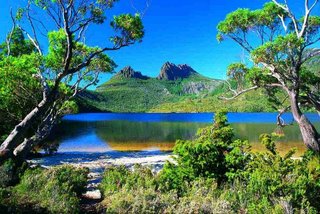
Breathtaking landscapes, rustic wildernesses, historic richness, and delectable cuisines – this describes Tasmania, one of the last unspoilt corners of the Earth. Tasmania’s repute as a leading award-winning natural destination led to it being lauded as one of the World’s top two islands (the other was Bali) by Travel + Leisure in 2002. More than 20 per cent of Tasmania’s area is listed with UNESCO as World Heritage Areas.
Here are some lessons from Tasmania which we can apply to the corporate world.
Cultivate Evangelists
Tasmanians are zealous about keeping their environment in its original pristine condition. These “emissaries” happily share what makes Tasmania unique as a destination, from its natural attractions, farm-fresh food, unique culture, to remarkable climate. I was particularly impressed with a coach captain with an encyclopaedic knowledge of everything about the island – its distance from Antarctica, its mating season for whales, its species of Eucalyptus trees and its social history.
Cultivating and nurturing advocates for your business should never be overlooked. These supporters of yours can be associates, suppliers, distributors, clients, or other contacts in your network. Encourage stakeholders to embrace your business ideals and equip them with product knowledge through training, briefings and other channels. By becoming your walking testimonies, they help to spread goodwill and generate leads.
Choreograph Positive Experiences
One of the most memorable encounters I had in Tasmania was visiting the Port Arthur Historic Site. Created with convict labour back in the early 19th century, a tour of Port Arthur’s various buildings brought one vividly back to the then squalid living conditions. Guides who were retired prison wardens animatedly brought these historic tales to life. The decaying ruins, musky odour, and environmental special effects further enhanced the experience.
Businesses need to go beyond providing goods and services. They need to orchestrate engaging experiences. Study how customers interact with your organisation and make those encounters delightful. When your client walks into your office, she could feel welcomed by the receptionist immediately offering a drink and extending assistance. Likewise, the retail experience is staged from the point the customer walks in to the point he pays for his products and leave.
Attention to Aesthetics
Much of Tasmania is beautifully kept and manicured to maintain its reputation as a wilderness paradise. Effort is made to keep every square metre of the island clean and green. Pollution is tightly controlled, with businesses urged to be environmentally friendly and adopt sustainable practices. Taking care of its aesthetics earned Tasmania numerous accolades with a landscape described as “spellbinding and refreshing”.
Likewise, pay close attention to the look and feel of your collaterals, office spaces, shop fronts and even staff. Customers can easily notice cracks in the wall, un-even décor, and badly designed brochures. Do not cut corners in areas which have direct interface with your customers. In aesthetics, the devil is in the details.
Focus on USPs
Tasmania owns an international reputation as Australia’s Natural State. Its value proposition to visitors is very clear – nature, fine wine and food, and a rich cultural heritage. This is further enhanced by its fine air quality – “one of the freshest in the world” – and cool refreshing climate. Throughout these years, Tasmania has wavered little from this theme in its tourism literature and marketing efforts.
Specialise in what you are good at and use it as a point of differentiation. Study how your competitors position themselves before creating your own Unique Selling Propositions (USPs). Too many companies are copycats, emulating ideas and concepts without considering their own strengths and limitations. Such strategies are unsustainable in the long-term.
Simple Solutions are Superior
Tasmania’s allure lies in its rusticity and ability to keep wildlife attractions authentic, natural and raw. It has not cluttered its appeal with man-made offerings and artificial constructs. While tourism is a pillar of its economy, much care has gone into minimising the negative environmental impact of commercialisation and industrialisation.
Beware of adding on new features to your products ad inifinitum without asking your customers what they really want. Perhaps all they need are just down-to-earth products and user-friendly solutions. More often than not, ease of use is preferred over multiple state-of-the-art functions.
